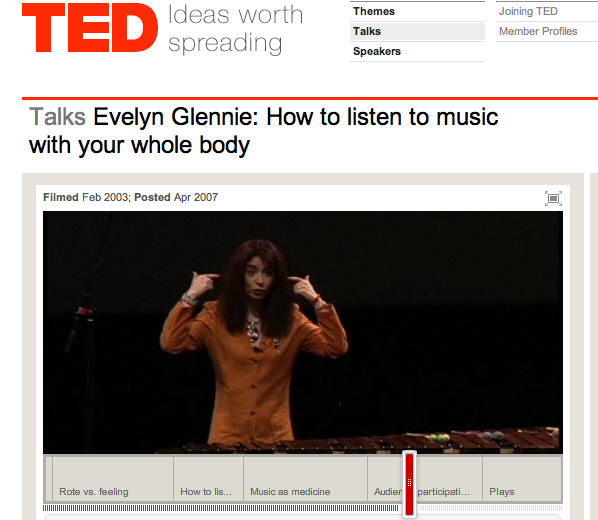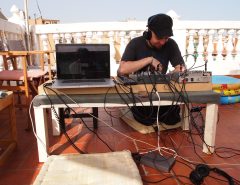Hace un par de días que descubrí (gracias a Miguel Negrao por la info) el website de TED (Tecnología+Entretenimiento+Diseño), una organización que desde 1984 reune en una conferencia anual a un buen número de pensadores, científicos y artistas que trabajan en esos tres campos, para hablar sobre sus vidas y actividades. El lema de esta iniciativa es algo así como «ideas que merece la pena difundir», y lo mejor de todo es que ahora están publicando con licencia creative commons una selección de las charlas más destacadas de su archivo, ya hay más de 200 y siguen subiendo más cada semana a su web.
En la primera ojeada rápida a los videos de la web, he encontrado uno que nos interesa especialmente por aquí. Se trata de una charla de Evelyn Glennie, quien ya apareció en estas páginas a propósito del documental «Touch the Sound», dedicado a ella misma. Evelyn es una percusionista que perdió casi totalmente la audición a los 12 años y que dedica su vida a cultivar una escucha diferente, profunda e intensa y que se dedica a enseñar a escuchar, además de tener una reconocida trayectoria musical. El video dura 32 min, y lleva por título «Cómo escuchar música con todo tu cuerpo.»
[Talk: Evelyn Glennie: How to listen to music with your whole body]
In this soaring demonstration, deaf percussionist Evelyn Glennie leads the audience through an exploration of music not as notes on a page, but as an expression of the human experience. Playing with sensitivity and nuance informed by a soul-deep understanding of and connection to music, she talks about a music that is more than sound waves perceived by the human ear. She illustrates a richer picture that begins with listening to yourself, and includes emotion and intent as well as the complex role of physical spaces — instrument, concert hall and even the bones and body cavities of musician and listener alike.
Why you should listen to her:
Evelyn Glennie’s music challenges the listener to ask where music comes from: Is it more than simply a translation from score to instrument to audience? How can a musician who has almost no hearing play with such sensitivity and compassion?
The Grammy-winning percussionist and composer became almost completely deaf by the age of 12, but her hearing loss brought her a deeper understanding of and connection to the music she loves. She’s the subject of the documentary Touch the Sound, which explores this unconventional and intriguing approach to percussion.
Along with her vibrant solo career, Glennie has collaborated with musicians ranging from classical orchestras to Björk. Her career has taken her to hundreds of concert stages around the world, and she’s recorded a dozen albums, winning a Grammy for her recording of Bartók’s Sonata for Two Pianos and Percussion, and another for her 2002 collaboration with Bela Fleck.





Leave a Reply
Lo siento, debes estar conectado para publicar un comentario.